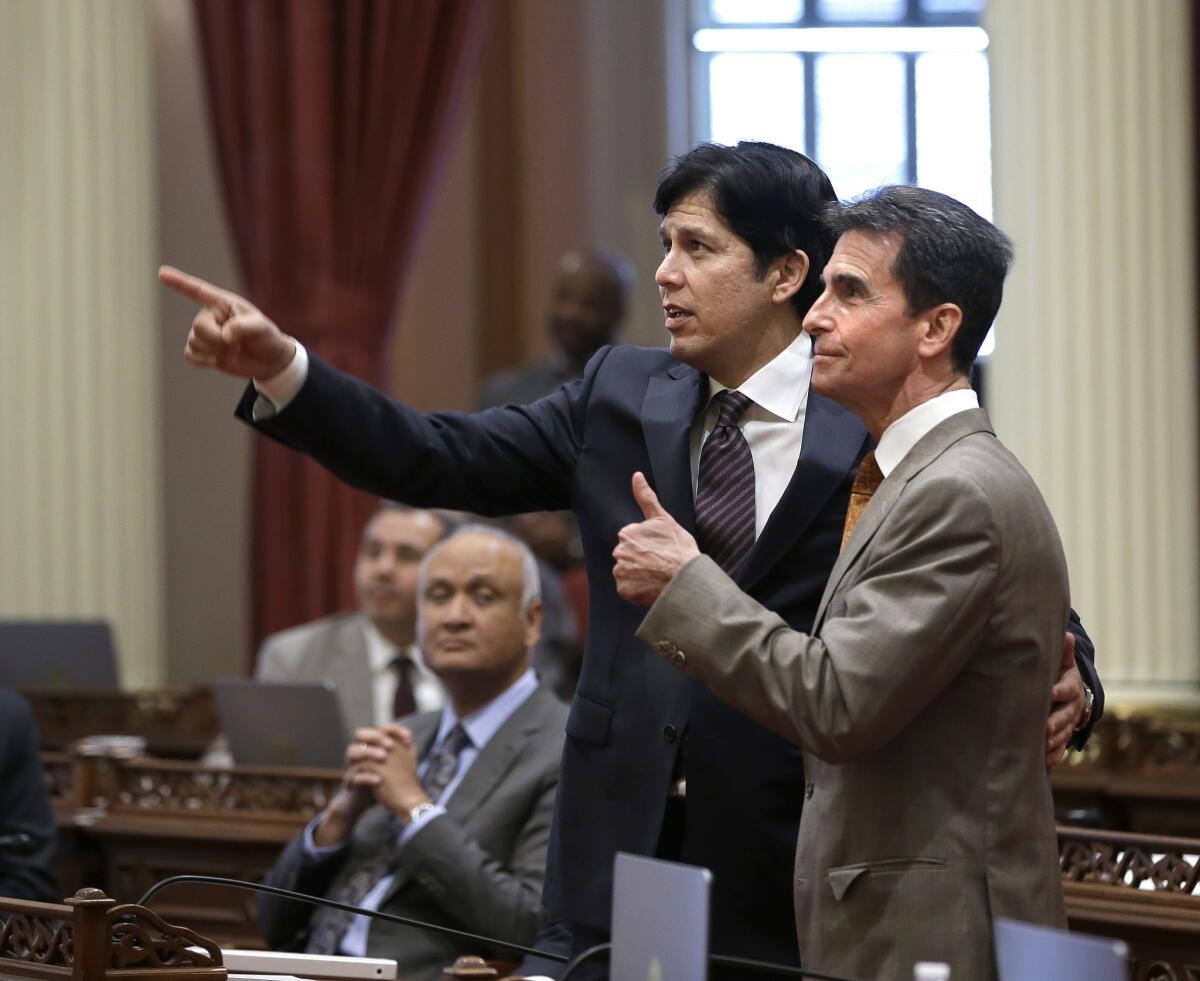Capitol Journal: On minimum wage, the do-something Legislature outshines a do-nothing Congress

State Sen. Mark Leno, right, and Senate President Pro Tem Kevin de León watch as votes on the minimum wage bill are posted in the Capitol on March 31. The bill, which would raise the wage to $15 an hour by 2022, was approved by both houses of the Legislature.
The California public’s view of the state Legislature has improved remarkably in recent years. And last week there was an example why.
Unlike the worthless Congress, state lawmakers actually are doing things. Not everything they should be, not the hardest tasks — fixing highways, streamlining regulation, lowering tuition, reforming taxes.
But the legislators do periodically pass important bills, such as last week’s legislation to dramatically boost the state’s minimum wage.
It isn’t all wonderful. There’s good, bad, nobility and ugliness. Some legislative deeds serve the public, some serve politics. Most serve both. That’s how the system was set up.
Whatever, there are fewer angry peasants with pitchforks storming the Capitol these days.
A recent poll by the Public Policy Institute of California found that 44% of state residents approve of the Legislature’s job performance, with 39% disapproving. Likely voters weren’t as chipper: 38% approved and 50% disapproved.
But back in the recession — as legislators slashed public services and squabbled all summer over state budgets — their approval ratings were in the low teens.
In last month’s PPIC poll, only 14% of voters approved of Congress’ work. But 53% liked what President Obama is doing.
One reason, of course, is that the California electorate is dominated by Democrats and left-leaning independents. Congress is Republican.
But in Sacramento, unlike Washington, major legislation is being passed.
Examples this year besides minimum wage: Raising the smoking age to 21 and regulating electronic cigarettes. Taxing managed care health plans in a way that doesn’t hurt insurers or consumers while drawing $1.3 billion from the feds.
There are many reasons for the Legislature’s popularity rise. One is the economic recovery. Voters are in a better mood.
Another is that since 2011 — Jerry Brown’s first year back as governor — legislators have been able to pass a state budget on a majority vote. They haven’t needed to embarrass themselves by clawing for two-thirds.
Moreover, passing bills is a lot easier when there’s one-party control of government. Democratic legislators outnumber Republicans almost 2 to 1. That means strong labor influence — not only over lawmakers, but the Democratic governor.
During the minimum wage debate in the Assembly, a Republican painted an amusing — and somewhat accurate — picture of backroom maneuvering over the bill. Assemblyman Brian Jones of Santee likened it to the Wizard of Oz.
He envisioned Dorothy, Scarecrow, Tin Man and Cowardly Lion skipping down the Yellow Brick Road from the Legislature to see the Wizard in the governor’s office. But when they looked behind the curtain, Jones said, “it wasn’t the governor pulling the levers. It was the labor unions.”
No question: Labor leaders pulled levers.
Two unions were sponsoring ballot initiatives to raise the minimum wage from $10 an hour to $15. Polls showed they’d probably pass. Bernie Sanders has been crusading for the cause, rallying liberals.
Brown thought the wage hike was inevitable and wanted to tone it down. Under the compromise, it’ll take longer to reach the $15 pay — six years. The governor could also suspend the yearly phase-ins if the economy starts to tank.
The unions will drop their initiatives.
The deal was reached just before Easter break, according to one source involved in the negotiations who wasn’t authorized to publicly blab. The agreement was leaked earlier than planned, during Easter weekend, because the governor’s office heard that New York Gov. Andrew Cuomo was about to make a similar announcement and wanted to beat him to the punch.
Cuomo will sign his state’s $15-per-hour measure Monday morning, just before a rally with Hillary Clinton. Unlike California’s — but like Oregon’s new minimum wage — New York’s plan would vary regionally, with the highest pay required only in the steepest cost-of-living areas.
California missed a chance to be similarly innovative and impose different wage floors depending on a region’s economy.
“We’re one state, but we’re at least two economies,” says state Chamber of Commerce President Allan Zaremberg.
Yes, Blythe and Beverly Hills, Susanville and San Francisco aren’t recognized in Sacramento as being polar opposites economically. One wage fits all.
“I worry about the impact in the Central Valley,” says Alec Levenson, labor economist at USC’s Marshall School of Business. “And I don’t know that I would have increased the wage by $5 so quickly.”
Additionally, Levenson says, the minimum wage is “one tool to adjust poverty, but not the only tool. There’s a better tool: The earned-income tax credit.”
But the $15 wage is the Democratic rage. Furthermore, the earned-income tax credit hurts government’s pocket. Minimum wages mostly ding private employers.
Labor wouldn’t agree to regional differences. It vowed to fight for a ballot initiative.
That scared Democratic legislative leaders. It meant many millions of union dollars would be spent on a ballot measure — rather than on Democratic candidates for the Legislature.
It also would make it harder to raise union money for another Democratic cause: An initiative to extend an expiring “soak the rich” tax increase for schools.
So the political timing was ripe for a minimum wage deal. And it zipped through the Legislature in three days.
Never mind arguments that it could price some small businesses out of hiring and force them to lay off workers.
Or that it could generate inflation and hurt the elderly poor on fixed incomes. And for the first time, the minimum wage will be adjusted higher each year to match inflation, further forcing up costs.
But unlike Congress, California’s Capitol is functioning. And the public is noticing.
Twitter: @LATimesSkelton
ALSO:
Legislature approves minimum wage deal, sends bill to Gov. Brown
Minimum wage measure passes Appropriations Committee, heads to Legislature
Gov. Brown hails deal to raise minimum wage to $15 as ‘matter of economic justice’
Timeline of minimum wage increases in California
Who wins with a $15 minimum wage?
Your voices: How would a minimum wage impact you?
More to Read
Get the L.A. Times Politics newsletter
Deeply reported insights into legislation, politics and policy from Sacramento, Washington and beyond. In your inbox three times per week.
You may occasionally receive promotional content from the Los Angeles Times.







